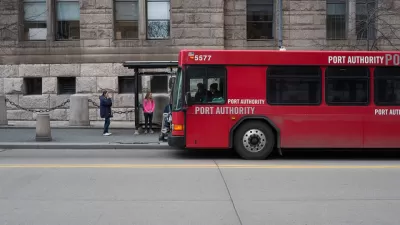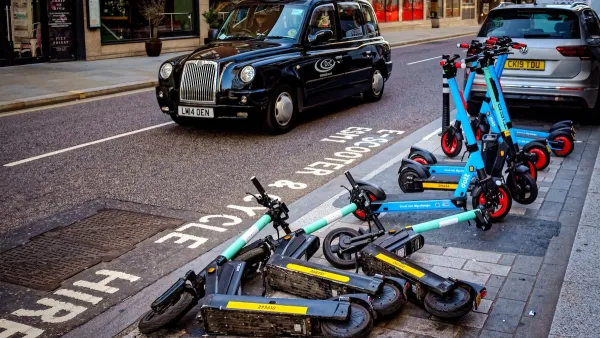The collective of micromobility and shared mobility operators is tasked with developing an integrated system that would better serve the diverse needs of travelers.

Laura Bliss reports on the Pittsburgh Mobility Collective, a consortium of mobility service providers that is working to provide multiple services through one platform. Participants include Spin, Zipcar, Ford Mobility, Waze, Swiftmile, and the Transit app.
Pittsburgh’s transportation department had issued a request for plans that would provide car-free travel alternatives:
[The Mobility Collective’s] winning plan, which was one of five submissions, envisions "mobility hubs" clustered near transit stops throughout Pittsburgh. There, travelers would find some combination of bike-share stations, Zipcar vehicles, Waze carpool pickup spots, and parked and charged e-bikes and scooters from Spin to rent. The Transit app would handle route planning and ticketing services to customers, and Ford Mobility would feed data analytics back to the city.
Bliss reports that the project is bringing together companies that in most other contexts operate as competitors. But Pittsburgh officials particularly wanted bundle services for travelers who might face challenges accessing and using existing individual services.
The city is offering the participating companies some incentives, reports Bliss. "For one, the city is keeping other mobility competitors out of play for the time being, according to [Karina] Ricks. And two, her department will work closely with the collective to remove obstacles to their success on the street."
FULL STORY: A Micromobility Experiment in Pittsburgh Aims to Get People Out of Their Cars

Planetizen Federal Action Tracker
A weekly monitor of how Trump’s orders and actions are impacting planners and planning in America.

Map: Where Senate Republicans Want to Sell Your Public Lands
For public land advocates, the Senate Republicans’ proposal to sell millions of acres of public land in the West is “the biggest fight of their careers.”

Restaurant Patios Were a Pandemic Win — Why Were They so Hard to Keep?
Social distancing requirements and changes in travel patterns prompted cities to pilot new uses for street and sidewalk space. Then it got complicated.

Platform Pilsner: Vancouver Transit Agency Releases... a Beer?
TransLink will receive a portion of every sale of the four-pack.

Toronto Weighs Cheaper Transit, Parking Hikes for Major Events
Special event rates would take effect during large festivals, sports games and concerts to ‘discourage driving, manage congestion and free up space for transit.”

Berlin to Consider Car-Free Zone Larger Than Manhattan
The area bound by the 22-mile Ringbahn would still allow 12 uses of a private automobile per year per person, and several other exemptions.
Urban Design for Planners 1: Software Tools
This six-course series explores essential urban design concepts using open source software and equips planners with the tools they need to participate fully in the urban design process.
Planning for Universal Design
Learn the tools for implementing Universal Design in planning regulations.
Heyer Gruel & Associates PA
JM Goldson LLC
Custer County Colorado
City of Camden Redevelopment Agency
City of Astoria
Transportation Research & Education Center (TREC) at Portland State University
Camden Redevelopment Agency
City of Claremont
Municipality of Princeton (NJ)





























